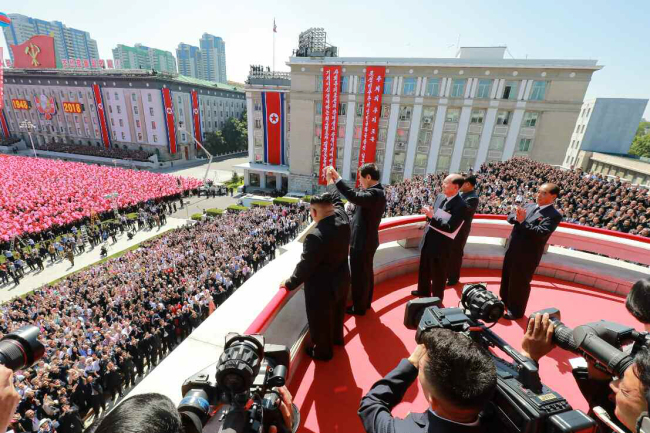North Korea’s recent decision to tone down its military parade for the 70th anniversary of its founding on Sunday was an indirect expression of its willingness to denuclearize, according to experts at a think tank under South Korea’s intelligence agency.
“The regime’s decision to exclude military commanders at the balcony seat (alongside leader Kim Jong-un) and reduce the size of the Korean People’s Army Strategic Force in the parade was (North Korea’s intention) to provide US President Donald Trump with justification for holding a second US-North Korea summit and sending his Secretary of State Mike Pompeo to Pyongyang,” said a report by the National Intelligence Service’s Institute of National Security Strategy.
 |
North Korean leader Kim Jong-un celebrates the 70th anniversary of its regime`s founding in Pyongyang on Sunday. (Yonhap) |
There is also a high possibility that the second Trump-Kim summit will happen as the two leaders believe breaking the current momentum of dialogue would not be beneficial for both sides, said Lee Ki-dong, vice president of INSS, at a press conference Tuesday.
According to the White House on Tuesday, Trump received a letter from Kim requesting a second meeting between the two, following their first summit in Singapore on June 12. Washington reacted positively to the letter, with White House press secretary Sarah Sanders saying that the US is open to a second summit and talks are underway to coordinate it.
The absence of its nuclear arsenal, such as intercontinental ballistic missiles or submarine-launched ballistic missiles, at Sunday’s parade, coupled with a lack of criticism aimed at the US during the iconic “mass games,” are signs that the rogue nation wants to continue denuclearization negotiations with the US, the report said.
The absence of ICBMs did not go unnoticed by Trump, who thanked Kim via Twitter earlier this week, calling the parade, “a big and very positive statement” from North Korea.
Denuclearization talks between Washington and Pyongyang have stalled for weeks, with Trump “postponing” Pompeo’s North Korea trip indefinitely last month, citing a lack of progress on denuclearization.
Regarding the timeframe of the next possible Trump-Kim meeting, an analyst said that though it is still uncertain, it would be best to schedule it before the November mid-term elections in the US and after the Moon-Kim summit.
US national security adviser John Bolton said Monday that it is possible to hold another US-North Korea summit by the end of the year.
“If the second Trump-Kim summit takes place, then both would have to reach an agreement on shedding key parts of the North’s nuclear program and clarifying the incentives that North Korea would receive in return for its cooperation -- which they failed to do in the first Sentosa summit,” said Lim Soo-ho, a senior researcher at the INSS, at a press conference held Tuesday.
By Jung Min-kyung (
mkjung@heraldcorp.com)








